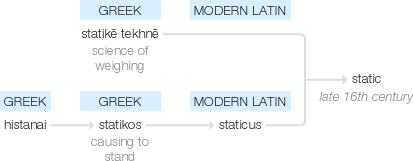Static
late 16th century (denoting the science of weight and its effects): via modern Latin from Greek statikē (tekhnē ) ‘science of weighing’; the adjective from modern Latin staticus, from Greek statikos ‘causing to stand’, from the verb histanai . Sense 1 of the adjective dates from the mid 19th century.
wiktionary
Modern Latin staticus, from Ancient Greek στατικός(statikós), from ἵστημι(hístēmi, “to make stand”).
etymonline
static (adj.)
1630s, "pertaining to the science of weight and its mechanical effects," from Modern Latin statica, from Greek statikos "causing to stand, skilled in weighing," from stem of histanai "to make to stand, set; to place in the balance, weigh," from PIE root *sta- "to stand, make or be firm." Earlier statical (1560s). The sense of "having to do with bodies at rest or with forces that balance each other" is first recorded 1802. Applied to frictional electricity from 1839.
static (n.)
"random radio noise," 1912, from static (adj.). Figurative sense of "aggravation, criticism" is attested from 1926.
